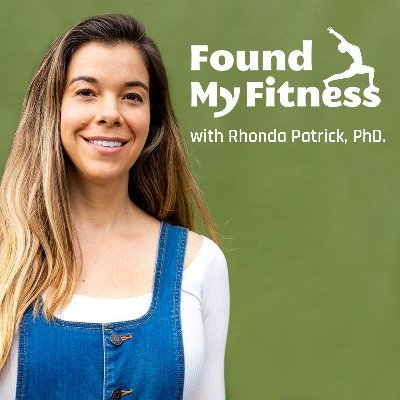
Dr. Rhonda Patrick
@foundmyfitness
Followers
603K
Following
4K
Media
601
Statuses
10K
Ph.D in biomedical science interested in nutrition, brain & aging. Host of FoundMyFitness podcast https://t.co/rirQwqebxL
Joined August 2009
RT @B_Holmer: Why do endurance athletes need low-intensity training?. Elite runners, cyclists, and triathletes—the fastest athletes out the….
0
84
0
I discuss specific creatine dosing protocols with Dr. Darren Candow on episode #100 of the podcast. Watch the full interview here.
6
5
37
How much creatine should you take? It depends on your goals. I typically take around 10 grams daily because this dose seems ideal for maximizing muscle strength, bone health, and brain benefits—advantages that might not fully appear at lower doses. Higher amounts, around 20.
.@foundmyfitness' creatine supplementation regimen:. • 5g on lighter workout days (e.g., running).• 10g most days, especially when strength training.• 20g (split into two 10g doses) when sleep-deprived for a cognitive boost.• Uses Thorne (NSF-certified for purity).• Takes it
68
140
1K
I’d be curious if @bryan_johnson attributes his 93% microplastic drop more to TPE or vigilance—avoiding processed foods, tap water, and plastic packaging. I would credit avoidance most; it’s the first step we should all take. While chemical detox via sauna (sweating) is.
I’ve reduced the microplastics in my blood by 93%. In October, my blood contained 15 particles. My latest sample contained only 1 particle. This is my best result to date. Only 1.6% of tests contain fewer microplastics. This comes from the largest dataset in the world on
35
35
653
RT @B_Holmer: L-Glutamine has been added to my supplement stack recently. Dr. Rhonda Patrick (@foundmyfitness) has me convinced on its be….
0
29
0
I'm getting lots of questions about whether microplastics and other chemicals are a concern with coffee filters. Most paper filters are made of cellulose (wood fiber) not synthetic plastic – any fibers released are plant-based, not synthetic microplastics. The worst offenders.
Coffee’s health impact depends on how you brew it. Filtered coffee is linked to a lower cancer risk, while unfiltered methods—like French press or boiled coffee—let oily compounds called diterpenes sneak into your cup. These compounds, particularly cafestol and kahweol, can
66
56
815
Coffee drinkers are biologically younger than those who abstain—and that could help explain why people who drink 2–3 cups per day have up to a 27% lower risk of dying from any cause. While this doesn’t necessarily mean coffee causes a longer life, there’s compelling biological.
Coffee may be the most overlooked anti-aging tool hiding in plain sight. Emerging research reveals that coffee can actively slow biological aging—each daily cup consumed correlates with a 0.7–1 year reduction in epigenetic age. Drinking 3+ cups daily reduces the risk of
126
281
2K
I'm getting a lot of questions about stevia in the comments. Most research indicates that stevia doesn't acutely increase appetite and may even reduce it. This makes it a suitable sugar substitute for those concerned about appetite and energy intake.
Drinking beverages sweetened with the zero-calorie sweetener sucralose may significantly alter brain mechanisms involved in hunger regulation, according to a new brain imaging study. Acute consumption of sucralose increased hypothalamic blood flow by 7.9% compared to
51
36
567







